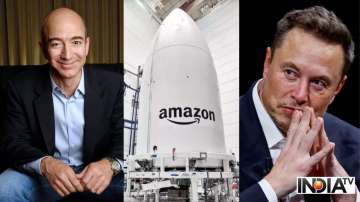Tesla and SpaceX CEO Elon Musk extended his well wishes to Jeff Bezos, Amazon’s founder and CEO Andy Jassy after Amazon's successful launch of its first two prototype Kuiper satellites for providing affordable internet services from space.
Jeff Bezos also announced the successful launch of X, expressing optimism for the future of affordable satellite broadband. Musk, who already provides cost-effective internet services through SpaceX's Starlink, responded to Bezos's announcement with a congratulatory message: "Congrats, this is hard!"
Amazon's Project Kuiper, a low Earth orbit (LEO) satellite broadband initiative, aims to deploy over 3,200 satellites in LEO to compete with Musk's Starlink, which currently operates over 4,000 satellites to offer affordable internet access. Amazon's initial production satellites are scheduled for launch in the first half of 2024, with beta testing for early commercial customers expected by the end of 2024.
The successful launch marked the beginning of the "Protoflight" mission for Project Kuiper, with a long journey ahead to realize its goals. Rajeev Badyal, Vice President of Technology for Project Kuiper, expressed gratitude for the team's dedication and partnership with United Launch Alliance in deploying their first spacecraft into orbit.
In July, Amazon unveiled plans for a $120 million facility dedicated to Project Kuiper satellites in the United States. This space will be used for the integration of Kuiper satellites with rockets from Jeff Bezos's Blue Origin and United Launch Alliance (ULA) before launch. Project Kuiper's infrastructure encompasses a constellation of 3,200+ satellites in low Earth orbit, cost-effective high-performance customer terminals, and ground networking supported by Amazon Web Services (AWS).
The race to provide affordable and accessible internet services from space continues, with both Amazon and SpaceX leading the charge, aiming to bridge the digital divide worldwide.
ALSO READ Countdown begins for Oppo Find N3 Flip launch: Here's what we know so far
Inputs from IANS
